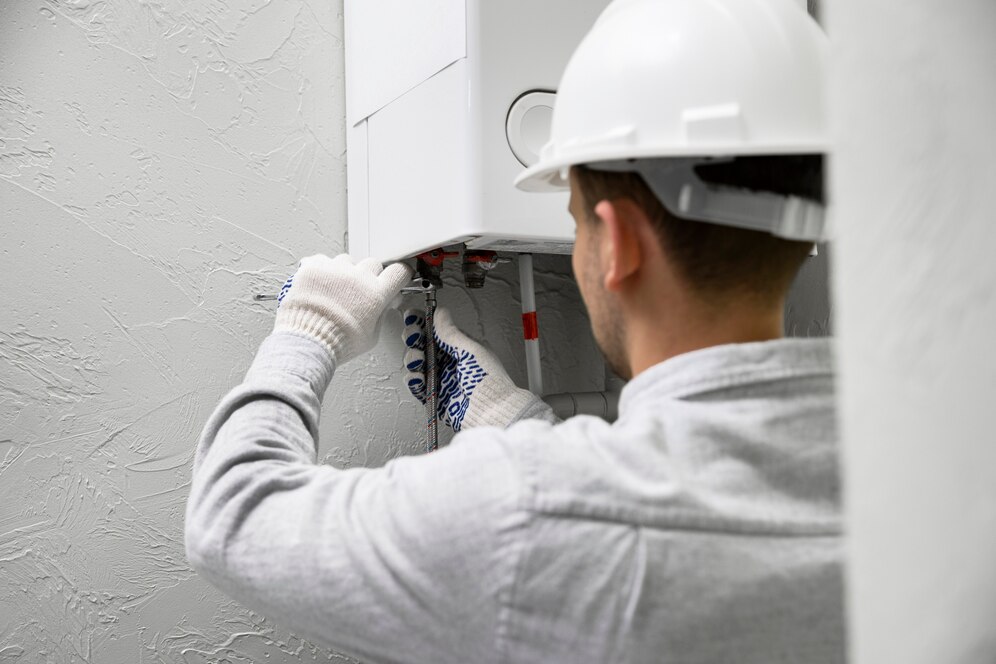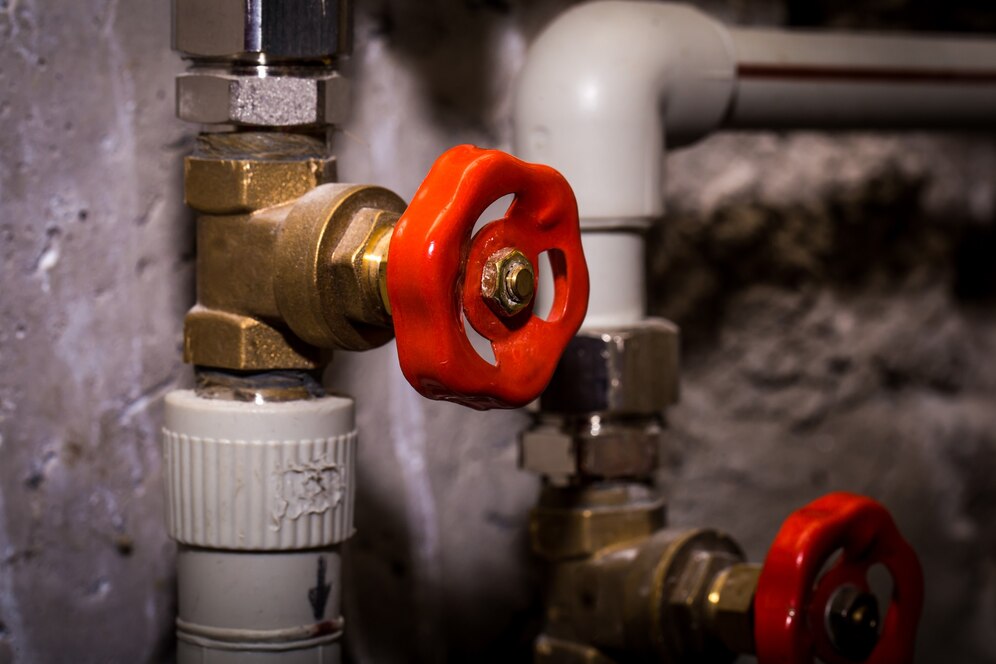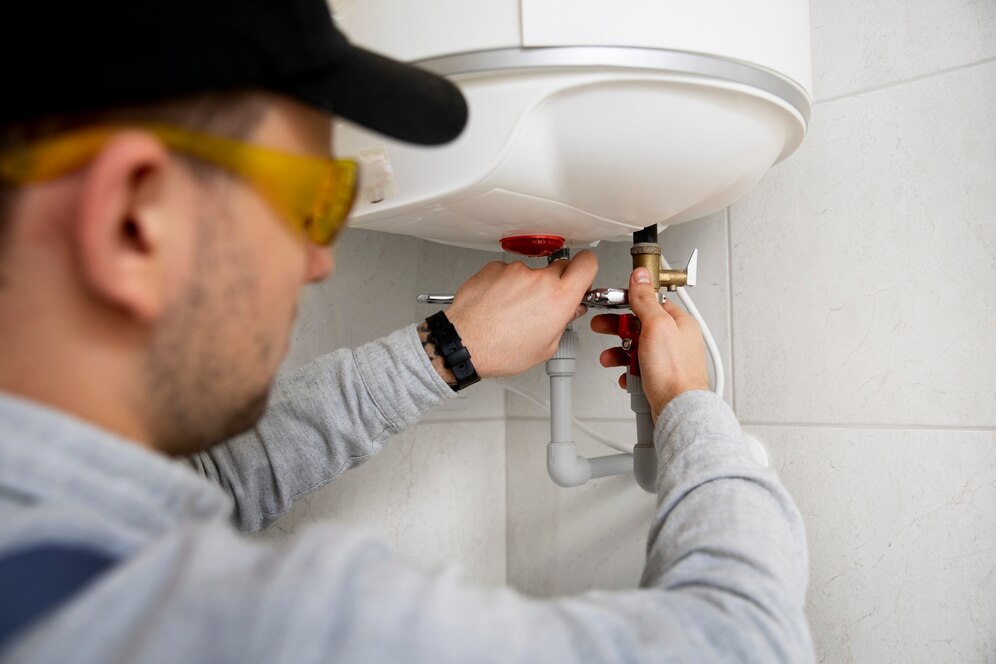Upgrading to an energy-efficient water heater reduces waste and lowers energy costs, which is crucial considering water heating accounts for about 18% of home energy use. Traditional models consume excess energy, while modern options—tankless, heat pump, solar, and high-efficiency gas—offer smarter solutions. Choosing the right system for tankless water heater installation depends on household size, climate, and fuel availability.
Here are the five key factors, that help homeowners invest in long-term savings and sustainability.
Table of Contents
Key Takeaways
✔ Choosing the right size ensures an energy-efficient water heater meets household demand without wasting energy.
✔ The best fuel type depends on local utility rates, availability, and long-term cost savings.
✔ Selecting the right heater type—tank, tankless, heat pump, or solar—optimizes efficiency based on usage patterns.
✔ Proper installation location improves performance, prevents heat loss, and extends the unit’s lifespan.
✔ Rebates and tax incentives reduce upfront costs, making high-efficiency models more affordable.
✔ Regular maintenance, like flushing sediment and checking insulation, keeps energy-efficient water heaters running efficiently.
✔ Understanding how different water heaters work helps homeowners choose the best system for long-term savings.

1. Choose the Right Size for Maximum Efficiency
Selecting the correct size is essential for ensuring energy-efficient water heaters operate at peak performance. A unit that’s too small won’t meet hot water demands, while an oversized one wastes energy by heating more water than necessary. Proper sizing depends on household size, usage patterns, and peak demand periods.
Why Size Matters for Efficiency
- Avoids Energy Waste: An oversized energy-efficient water heater heats unnecessary water, leading to higher energy costs. Right-sizing prevents excess heating, reducing waste and maximizing efficiency.
- Ensures Consistent Hot Water Supply: A unit that’s too small may struggle to meet daily hot water needs, especially during peak usage times. This can lead to lukewarm water during showers or dishwashing, forcing the heater to work harder and consume more energy.
- Extends the Lifespan of the Heater: A properly sized heater runs efficiently without constant overuse or strain. This reduces wear and tear, minimizing repairs and extending the unit’s lifespan.
How to Choose the Right Size
- Calculate Household Hot Water Demand: Estimate the number of gallons needed during peak times, such as mornings when multiple people use hot water. For tank models, the first-hour rating (FHR) helps determine if the heater can meet demand.
- Consider Flow Rate for Tankless Models: Tankless energy-efficient water heaters measure output in gallons per minute (GPM). Adding up GPM for showers, sinks, and appliances running simultaneously ensures the unit can handle peak demand.
- Factor in Climate and Incoming Water Temperature: Colder climates require higher capacity heaters since groundwater takes more energy to heat. Warmer regions allow for smaller units without sacrificing efficiency.
2. Choose the Best Fuel Type for Cost and Efficiency
The type of fuel a water heater uses significantly impacts its energy efficiency, operating costs, and environmental impact. Some fuel sources are more energy-efficient, while others may be cheaper or more accessible depending on location. Understanding fuel options helps homeowners choose the best system for long-term savings.
Why Fuel Type Affects Performance
- Impacts Energy Efficiency: Different energy-efficient water heaters convert fuel into heat at varying efficiency levels. Electric heat pump models use 60% less energy than standard electric heaters, while high-efficiency gas units perform better than traditional gas models.
- Affects Operating Costs: Fuel prices vary by region, influencing long-term expenses for tankless water heater installation. While natural gas is often cheaper than electricity, areas with high electricity costs may find solar or heat pump heaters more economical.
- Determines Installation Requirements: Some systems need specific venting, wiring, or gas lines. A natural gas unit requires proper ventilation to remove exhaust gases, while an electric heater may need an upgraded electrical panel to handle higher voltage.
How to Select the Right Fuel Type
- Check Local Utility Rates: Compare gas, electricity, and alternative energy costs in the area. Choosing a fuel source with stable pricing ensures predictable energy bills over time.
- Consider Energy Source Availability: Homes without natural gas access may find electric energy-efficient water heaters more practical. In sunny regions, solar water heaters can provide nearly free hot water after installation.
- Evaluate Upfront and Lifetime Costs: Some fuel types require higher initial investment but save more over time. A heat pump water heater costs more upfront but uses significantly less electricity, reducing long-term expenses.
3. Choose the Right Type for Household Needs
Each type of energy-efficient water heater operates differently, making it essential to choose one that aligns with household demands. Some offer continuous hot water, while others store heated water for later use. Understanding these differences helps homeowners make a well-informed choice.
Why the Type of Heater Matters
- Affects Hot Water Availability: Tank models store hot water for immediate use but may run out during heavy demand. Tankless models heat water on demand, providing endless hot water but with limited flow rates.
- Impacts Energy Consumption: Heat pumps and solar energy-efficient water heaters use renewable energy or heat transfer, reducing electricity usage. Gas and electric resistance heaters rely on constant energy input, making them less efficient.
- Determines Space Requirements: Some units for tankless water heater installation need more installation space than others. Tank models require a dedicated area, while tankless models save space by mounting on a wall.
How to Pick the Right Type
- Match Heater Type to Usage Patterns: Homes with steady water use benefit from a traditional tank, while those with fluctuating demand may prefer a tankless model. Large families using multiple fixtures at once should consider a high-flow unit.
- Assess Available Installation Space: Smaller homes or apartments may find compact tankless energy-efficient water heaters ideal. If space isn’t an issue, a heat pump or solar system may provide greater savings over time.
- Factor in Recovery Rate Needs: The recovery rate determines how quickly a heater replenishes hot water. High-demand households should opt for a unit with a faster recovery rate to prevent delays in hot water availability.
4. Take Advantage of Rebates and Incentives
Many states and utility companies offer rebates and tax credits for purchasing energy-efficient water heaters. These incentives lower the upfront cost and make upgrading to an efficient system more affordable. Homeowners who research available programs can save hundreds or even thousands of dollars.
Why Rebates and Incentives Matter
- Reduce Initial Costs: Some rebates cover a significant portion of the purchase price, making high-efficiency models more accessible. State and federal programs often provide incentives for heat pump, solar, and high-efficiency gas heaters.
- Encourage Energy Savings: Incentives promote the use of energy-efficient water heaters, lowering long-term electricity or gas bills. By offsetting costs, homeowners can invest in a more efficient model with better performance.
- Make Upgrading More Affordable: Replacing an outdated heater is expensive, but rebates ease the financial burden. Many programs offer instant discounts or tax credits to help with installation costs.
How to Find and Use Rebates
- Check State and Federal Programs: The U.S. Department of Energy and local energy offices provide lists of available rebates. Many utility companies also offer incentives for high-efficiency water heaters.
- Ask Retailers and Installers About Discounts: Some manufacturers and retailers provide additional rebates. Professional installers often have knowledge of regional programs and can guide homeowners toward the best deals.
- File Claims Promptly: Many rebates require proof of purchase and installation within a specific timeframe. Keeping receipts and submitting claims on time ensures homeowners receive the full benefit.
5. Maintain the Heater for Maximum Efficiency
Even the best energy-efficient water heaters lose efficiency if not properly maintained. Regular upkeep extends the lifespan, prevents unexpected breakdowns, and ensures optimal performance. Simple maintenance steps can keep the system running smoothly for years.
Why Maintenance Is Essential
- Prevents Efficiency Loss: Sediment buildup inside a tank model reduces heating efficiency, forcing the unit to work harder. Flushing the tank yearly removes sediment, restoring peak performance.
- Reduces Risk of Malfunctions: Leaks, corrosion, and faulty components develop over time. Regular inspections catch small issues before they become major problems.
How to Maintain an Energy-Efficient Water Heater
- Flush the System Annually: Drain and flush tank models to remove sediment that lowers efficiency. This prevents mineral buildup that can clog pipes and reduce heating performance.
- Check the Anode Rod for Corrosion: The anode rod protects the tank from rust, but it deteriorates over time. Replacing it every 3 to 5 years prevents corrosion and extends the tank’s lifespan.
- Insulate Pipes for Better Heat Retention: Wrapping hot water pipes in insulation reduces heat loss, helping energy-efficient water heaters perform better. This is especially useful for long pipe runs in cold areas.
How Energy-Efficient Water Heaters Work
Modern energy-efficient water heaters use advanced technology to minimize energy waste, driving market growth at an annual rate of 4.7% from 2024 to 2030. Unlike traditional models that continuously heat stored water, high-efficiency systems optimize fuel use, reduce standby heat loss, and improve overall performance. Understanding how different models operate helps homeowners choose the best tankless water heater installation system for their needs.
1. Heat Pump Technology Uses Ambient Air for Heating
Heat pump energy-efficient water heaters pull heat from the surrounding air and transfer it to the water instead of generating heat directly. This process, similar to how a refrigerator works in reverse, requires far less electricity than traditional electric resistance models. Because they rely on ambient air, heat pump units work best in warmer climates or well-ventilated spaces.
2. Tankless Systems Heat Water Only When Needed
Tankless energy-efficient water heaters activate only when a hot water tap is turned on, eliminating standby heat loss. Cold water passes through a high-powered heating element or gas burner, instantly reaching the desired temperature before flowing to the faucet. Since there’s no storage tank, these systems provide endless hot water but require the right flow rate to meet household demand.
3. Condensing Gas Heaters Reuse Exhaust Heat
Condensing gas water heaters improve efficiency by capturing and reusing heat from combustion gases that would otherwise be wasted. These units feature a secondary heat exchanger that extracts extra warmth from exhaust fumes before venting them outside. By maximizing heat transfer, condensing gas models use less fuel than standard gas heaters while producing the same amount of hot water.
4. Solar Water Heaters Harness the Sun’s Energy
Solar energy-efficient water heaters use rooftop collectors to absorb sunlight, which heats a fluid that transfers warmth to the water supply. These systems work best in sunny regions and often include a backup heating element for cloudy days. While upfront costs are higher, solar water heaters significantly reduce long-term energy expenses and reliance on fossil fuels.
5. Insulated Tanks and Smart Controls Reduce Heat Loss
Advanced tank-style energy-efficient water heaters use thick insulation and smart thermostats to maintain hot water temperature with minimal energy use. High-efficiency tanks reduce standby heat loss by keeping water warm for extended periods without frequent reheating. Smart controls allow homeowners to set heating schedules, further optimizing energy use based on daily hot water needs.
How to Find the Best Installation Location for an Energy-Efficient Water Heater
The placement for tankless water heater installation directly affects its performance, longevity, and safety. Choosing the right location ensures the unit operates at peak performance while minimizing energy waste and potential hazards.
1. Ensure Proper Ventilation for Gas and Heat Pump Models
Gas-powered energy-efficient water heaters require adequate airflow to prevent dangerous carbon monoxide buildup. These units should be installed in well-ventilated spaces with direct access to an outdoor exhaust vent or chimney. Heat pump water heaters also need proper air circulation, as they pull warmth from surrounding air and can lose efficiency in tight, enclosed spaces.
2. Choose a Location Close to Water Fixtures
The farther a water heater is from faucets, showers, and appliances, the longer it takes for hot water to reach them, increasing energy waste. Installing the unit near high-use fixtures reduces heat loss in the pipes and improves response time. For larger homes, placing a secondary point-of-use energy-efficient water heater near bathrooms or kitchens can further cut down on wasted water and energy.
3. Consider Basement, Garage, or Utility Room Space
Many energy-efficient water heaters work best in basements, garages, or utility rooms where they remain accessible yet out of the way. These locations provide enough space for proper installation while keeping the unit safe from weather exposure. However, unheated basements and garages in colder climates may require additional insulation around the unit and pipes to prevent heat loss.
4. Check for Proper Floor and Wall Support
Tankless energy-efficient water heaters are wall-mounted and require sturdy support to handle their weight and water connections. Traditional tank-style models are heavy, especially when filled with water, and need a solid, level floor to prevent tipping or leaks. Checking structural support before installation prevents damage and ensures long-term stability.
5. Avoid High-Moisture or Flood-Prone Areas
Installing a water heater in a space prone to flooding, such as a low-lying basement, increases the risk of damage and premature failure. Moist environments can also lead to rust, corrosion, and electrical malfunctions, reducing efficiency over time. If no other space is available, elevating the heater on a raised platform and installing a drain pan with a moisture sensor can help prevent costly damage.

Frequently Asked Questions (FAQs)
Can an energy-efficient water heater work with well water?
Yes, energy-efficient water heaters can work with well water, but certain factors must be considered. Well water often contains minerals like calcium and magnesium, which can cause scale buildup inside the unit, reducing efficiency over time. A water softener or descaling system helps prevent sediment accumulation and keeps the heater running smoothly. Tankless models may require additional filtration to prevent clogging, while heat pump models should be regularly maintained to remove any sediment that could impact performance.
Do energy-efficient water heaters increase home value?
Upgrading to an energy-efficient water heater can increase home value by making the property more attractive to buyers looking for lower utility costs. Many homebuyers prioritize energy-efficient features, and having a high-efficiency water heater can be a strong selling point. Additionally, homes with eco-friendly upgrades, including solar or heat pump water heaters, may qualify for better appraisal values.
Can energy-efficient water heaters be used in mobile homes or RVs?
Yes, but not all energy-efficient water heaters are designed for mobile homes or RVs, so it’s important to choose a compatible model. Tankless water heaters are popular for mobile applications because they save space and provide hot water on demand without requiring a large storage tank. Some heat pump models also work in mobile homes, but they require adequate space and ventilation for proper operation. Always check manufacturer specifications to ensure the unit meets HUD or RV certification standards.
Can a backup power source be used with an energy-efficient water heater during outages?
Yes, certain energy-efficient water heaters can be connected to backup power sources like generators, battery storage systems, or solar power. Electric tank and tankless models typically require a dedicated power supply, so having a backup system ensures continued operation during blackouts. Gas-powered units with electronic ignition may need a battery backup or manual ignition option to function without electricity. Solar water heaters with thermal storage can provide hot water even when the power is out, making them an ideal choice for off-grid or backup-reliant setups.
Do energy-efficient water heaters work in off-grid homes?
Yes, many energy-efficient water heaters are suitable for off-grid homes, especially solar and propane-powered models. Solar thermal water heaters use the sun’s energy and often include backup systems for cloudy days, making them highly effective for remote locations. Tankless propane water heaters are another common off-grid option, providing instant hot water without relying on electricity.
Choose Reliable Full-Service Plumbing in Watertown, CT, Today!
When plumbing issues arise, trust L&P Plumbing in Watertown, CT, for expert solutions that get the job done right. As a full-service plumbing company, we handle everything from routine maintenance and leak repairs to full system installations with precision and care. Whether it’s fixing a stubborn clog, upgrading outdated pipes, or installing high-efficiency fixtures, our team delivers top-quality workmanship with a commitment to customer satisfaction.

